Presenters
|
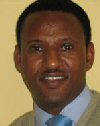 Pawlos
kassu Abebe (Ethiopia) Pawlos
kassu Abebe (Ethiopia)
Pawlos is Deaf and is a lecturer in the department of linguistics
and philology, Ethiopian sign language and Deaf Culture at
Addis Ababa University, Addis Ababa, Ethiopia.
Pawlos hold a masters degree in Deaf Education. He has worked
in Nigeria, Cameron and Ethiopia and has been involved in
research and promotion of Deaf rights, sign language and Deaf
Culture. He has published three books around these themes.
He was also the first to produce a film in Sign Language in
Nigeria and Ethiopia.
|
|
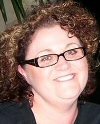 Karen Bontempo (Australia)
Karen Bontempo (Australia)
Karen is a practicing Auslan/English interpreter, with 20
years experience in the field. Her academic qualifications
are in psychology, linguistics and education. She is a part-time
PhD candidate at Macquarie University, where she is a member
of the Centre for Translation and Interpreting Research, the
Applied Linguistics in Language and Education Research Centre,
and the Sign Language Linguistics Group. Karen chairs the
ASLIA National Interpreter Trainers' Network, and has taught
interpreters for over 14 years. She is on the editorial board
of the Sign Language Translator and Interpreter journal and
the International Journal of Interpreter Education, and she
has published work regarding her research interests in interpreter
aptitude and performance. Karen recently commenced employment
on a part-time basis as a teacher at the Shenton College Deaf
Education Centre.
|
|
 Jeff
Brattan-Wilson (UK) Jeff
Brattan-Wilson (UK)
Jeff has been involved in training interpreters for six years.
He has worked as an on screen interpreter for ten years for
various media companies; such as ITV, BBC, S4C and has translated
many documents.
Jeff has been working in the advocacy field for five years
and is now managing the advocacy service in Wales and England
for the British Deaf Association. At this conference, Jeff
feels he will have the unique opportunity to merge his two
specialisms for the benefit of the interpreters' personal
development.
|
|
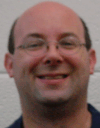 Richard
Brumberg (USA) Richard
Brumberg (USA)
Richard Brumberg, B.A., CI/CT, NIC, has been working in the
field of interpreting since 1992. For 14 years, Richard specialized
in full-time K-12 public schools settings. In New York, Richard
worked as a staff interpreter for a Deaf-owned interpreting
agency and as an interpreter in the school systems. In North
Carolina, he served on the board of Coastal RID as Educational
Liaison, working to create ties between educational interpreters
in his region. Since his return to Georgia, he has worked
in conjunction with the Georgia Department of Education and
Department of Labor to help working educational interpreters
obtain qualification or certification. In 2009, he was appointed
co-chair of the Educational Interpreters Special Interest
Group of GaRID, a honor he holds dear to his heart! To date,
Richard has presented in Maryland, North Carolina, Nevada,
Florida, Texas, Alabama, Georgia, Arizona, London, Madrid
and Sydney. Currently, Richard lives in Atlanta, GA where
he works as a full-time freelance
interpreter. As always, he is delighted to be a part of SDP!
|
|
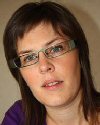 Goedele
A. M. De Clerck (Belgium) Goedele
A. M. De Clerck (Belgium)
As a postdoctoral scholar of the Research Foundation Flanders
(FWO), Dr. De Clerck is affiliated with the Center for Intercultural
Communication and Interaction at Ghent University, Belgium.
Her research project focuses on identity dynamics and emancipation
processes in Deaf communities in different social, cultural,
and political contexts. Last year she started a case study
on emancipation processes in the Cameroon Deaf community.
She has almost 10 years of experience in anthropological research
on empowerment, identity, and agency in Deaf communities.
In her research projects she has taken a transnational and
comparative perspective, giving particular attention to personal
and community development. Dr. De Clerck was a visiting scholar
at Gallaudet University, DC, from 2005 until 2007.
In 2009 she received a doctorate in Comparative Science of
Culture from Ghent University. For her dissertation she wrote
on empowerment, identity, and agency in Flemish and international
deaf role models. She was the first Deaf person to defend
her dissertation in sign language in Belgium, for which she
received the The Hand of Flanders award from The Flemish
Deaf Association (Fevlado) in 2010. Dr. De Clerck has published
in national and international journals and books on the topics
of anthropology, development, and Deaf studies; empowerment,
emancipation, and identity dynamics in deaf communities; on
deaf education, and on deaf epistemologies.
|
|
 Anne
Darby (UK) Anne
Darby (UK)
Anne Darby has a wide interest in advocacy, representation
and service delivery focusing on equality, empowerment and
access. Originating from a family with members progressively
deaf from childhood, she works with other deaf people and
uses BSL interpreters to gain access to meetings. Some of
her work is with students who have English as a second language
to assist their production of written work. Her publications
include co-editorship of Deaf Identities (2003, Douglas McLean)
with George Taylor.
|
|
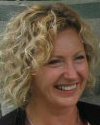 Jules
Dickinson (UK) Jules
Dickinson (UK)
Jules is a practitioner-researcher, working as a BSL/ English
interpreter and undertaking research in workplace settings.
Her PhD, 'Interpreting in a Community of Practice: A Sociolinguistic
Study of the Signed Language Interpreter's Role in Workplace
Discourse', explores the ways in which interpreters affect
the dynamics between deaf and hearing employees. Her work
focuses on the use of humour, small talk and the collaborative
floor in a workplace community of practice. She is keen to
see a collaborative approach to interpreting in workplace
settings, actively involving and engaging both deaf and hearing
employees in the interpreting process.
|
|
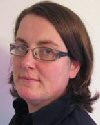 Jen
Dodds (UK) Jen
Dodds (UK)
Jen has worked in the British Deaf community for many years,
initially as a journalist/editor with publications such as
British Deaf News, Read Hear, The Voice, Deaf Arts UK, and
as associate editor of Deaf Worlds: International Journal
of Deaf Studies. She also worked as a research assistant at
the University of Central Lancashire (UCLAN); as a language
tutor with Deaf students at the same establishment; and as
a freelance BSL/English translator . Nowadays, Jen is a partner
at Team HaDo,
offering services such as BSL/English translation and interpreting,
proofreading, editing and copywriting. She has a first degree
in Media Production and successfully completed the UCLAN Postgraduate
Diploma in British Sign Language/English Interpreting and
Translation in 2009, becoming a Member of the Register of
Sign Language Interpreters (MRSLI) shortly after.
|
 Steve
Emery (UK) Steve
Emery (UK)
Steve obtained his PhD in 'Citizenship and the Deaf Community'
in 2007. He has just completed a follow-up post-doctorate
research project on 'Minority Group Rights and Deaf People'
with the Leverhulme Trust and the University of Bristol. He
is now working as a research associate on the project 'Genetics
and Deafhood', led by Dr Paddy Ladd and also funded by Leverhulme.
Steve is Deaf since early childhood and has worked across
the UK and Ireland since leaving his hometown, Brighton, where
he still has strong family roots. Prior to his doctorate he
was employed to work in the Deaf community in several roles,
including as a counsellor, for which he also holds a full
qualification, community development work and advice work.
He received his BA (Hons) in cultural studies from Sheffield
Hallam University in 1992. Research project collaborations
include a sociological history of BSL, and genetic counselling
in the Deaf community. Steve has several publications in journals
and book chapters. His forthcoming DVD in BSL of his PhD is
due to be published by Ishara Press in winter 2010, and will
include an English book version.
|
|
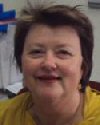 Bethel
Hutchinson (Australia) Bethel
Hutchinson (Australia)
Bethel has worked as a qualified teacher of the deaf for
13 years, after specialising in the education of children
with special needs from the time of her first degree. Bethel
broadened her experience in Deaf education as a visiting teacher
in country Western Australia, as well as in Perth, and has
held leadership positions in the visiting teacher service,
as well as her current position as the principal of Shenton
College Deaf Education Centre. Bethel has previous experience
as the coordinator of a high needs unit at a secondary school,
in vision impairment services and in training educational
assistants working with Deaf and hard of hearing students.
A strong advocate for her profession, Bethel has been a mentor
to new visiting teachers, has overseen professional development
provided to teachers in a school for the Deaf in the Philippines,
and was secretary of the Australian Association of Teachers
of the Deaf (WA) for 5 years including during the period of
the Australian New Zealand Educators of the Deaf Conference.
She is passionate about providing the best access to education
for all Deaf and hard of hearing students.
|
|
 Harlan
Lane (USA) Harlan
Lane (USA)
A specialist in the psychology of language with a focal interest
in Deaf people, Harlan Lane is the author of numerous articles
in professional journals concerning speech, language, and
Deaf people. He has written or edited fourteen books, among
them, The Wild Boy of Aveyron, When the Mind Hears:
A History of the Deaf, and The Mask of Benevolence:
Disabling the Deaf Community. His most recent book (with
U. Hedberg and R. Pillard) is The People of the Eye: Deaf
Ethnicity and Ancestry. His honorary awards include the
International Social Merit Award of the World Federation of
the Deaf; a MacArthur Foundation Fellowship (the "genius"
award); the Distinguished Service and Literary Achievement
Awards of the National Association of the Deaf; and the Order
of Academic Palms from the French government.
|
|
 Robert
G. Lee (UK) Robert
G. Lee (UK)
Robert G. Lee, MA, CI, CT is an ASL-English Interpreter for
over twenty years in a variety of settings, specializing in
medical situations and conferences. He is currently senior
lecturer in Deaf Studies at the University of Central Lancashire
in Preston, England and course leader for the postgraduate
diploma and MA in BSL/English Interpreting and Translation.
He holds an MA in applied linguistics from Boston University
and has taught interpreting and linguistics at Northeastern
University as well as in seminars in US, Canada, the UK and
Europe. Robert has authored or co-authored a number of articles
and chapters on both Interpreting and the linguistics of ASL.
He is a co-author of the MIT Press book, The Syntax of
American Sign Language: Functional Categories and Hierarchical
Structure.
|
 Peter
Llewellyn-Jones (UK) Peter
Llewellyn-Jones (UK)
Peter Llewellyn-Jones is a founder member of the Register
of Interpreters for England, Wales and Northern Ireland. He
has extensive experience in community, legal, medical, conference,
television and theatre interpreting. He co-founded the University
of Bristol sign language and interpreting research team and
has taught at the Universities of Durham and Wolverhampton.
Peter has been a consultant to organizations and universities
worldwide and acted as the ‘expert advisor’ on interpreting
to European Commission Leonardo/Socrates projects. He is the
managing director of Sign Languages International, a training
and consultancy company based in England as well being a senior
teaching fellow and programme director at the Leeds University
(UK) Centre for Translation Studies. In July 2010, in recognition
of his outstanding achievements in the field of sign language
interpreting, Peter was awarded an Honourary Fellowship from
the University of Central Lancashire.
|
|
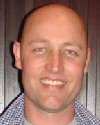 Marcel
Leneham (Australia) Marcel
Leneham (Australia)
Marcel is the president of the Australia Sign Language Interpreters'
Association National Executive Committee. Marcel completed
the MA programme in Translation and Interpreting at Macquarie
University, Sydney, and is currently completing his PhD at
the same institution, researching strategies in Auslan/English
translation. Marcel is also a casual lecturer at Macquarie
University with students studying translation and interpreting
in both signed and spoken languages. Marcel also has a BA(Hons)
in visual art and a Graduate Diploma of Education, and has
previously taught deaf children in primary and secondary schools.
He enjoys art, theatre, cooking and travel.
|
|
 Sam
Lutalo-Kiingi (Uganda/UK) Sam
Lutalo-Kiingi (Uganda/UK)
Sam Lutalo-Kiingi is Deaf and was born in Uganda. He is currently
undertaking a PhD project on the linguistics of Ugandan Sign
Language (USL) at the International Institute for Sign Language
and Deaf Studies (iSLanDS) at the University of Central Lancashire
(UCLan), which he is due to complete in September 2011. Sam
is also involved in course development and student liaison
at iSLanDS. He achieved a first-class BA degree in deaf studies
at UCLan in 2008, and received a certificate and diploma in
sign language studies from University College Copenhagen,
Denmark, in 1998.
He is a sign language lecturer at Kyambogo University in Uganda,
and is fluent in seven national sign languages and International
Sign. For over 15 years, he has taught several different sign
languages in Uganda, Kenya, Zambia, Tanzania and the UK. He
started his teaching career by developing a USL teaching programme
for trainee interpreters and sign language trainers with the
involvement of the Ugandan National Association of the Deaf
(UNAD). His most recent work has been on a British Council
funded project that aims to establish sign language and deaf
studies courses at universities in Ghana and Uganda.
Sam has written in a number of publications related to language
and linguistics, including Possessive and Existential Constructions
in Sign Languages and The Ugandan Sign Language Dictionary,
and Technology and Ethics in Sign Language Research. He is
currently on the editorial board of the upcoming book The
World's Sign Languages. In 2009, Sam was the keynote speaker
at the World Congress of African Linguistics (WOCAL6) in Cologne,
Germany.
Sam is a board member for the Deaf Empowerment Foundation
(DEF), based in the Netherlands, and is on the Sign Language
Expert Board for the World Federation of the Deaf (WFD) in
Finland. In addition, he continues to work with other leaders
of the Deaf community in Uganda and East Africa. Sam is the
first member of this Deaf community to study for a PhD, and
the first deaf African to undertake a PhD in linguistics.
|
|
 Kathryn
Mason (UK) Kathryn
Mason (UK)
Kathryn works as a researcher at the Deafness Cognition and
Language Research Centre (DCAL) at University College London,
and at City University London in the department of Language
and Communication Science. She has a Bachelors degree in psychology
from the University of Manchester and a Masters in psychological
research methods.
After working as a communication support worker for deaf children
in a mainstream school, Kathryn joined DCAL and City University
London in 2007 to work on a project investigating specific
language impairment (SLI) in deaf children acquiring sign
language. This is the first major study of language impairment
in deaf signing children which aims to better understand and
characterise SLI in sign language, in addition to developing
specific tests and interventions to use with this group. The
research has been presented for discussion with specialist
groups in the UK and at international conferences.
|
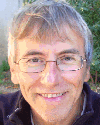 Geoff
Minshull (Technical Support) Geoff
Minshull (Technical Support)
Geoff works for Direct Learn Services. He has been in further
education since 1983, mainly in the UK, during which time
he has worked with a wide range of businesses and organisations.
He has also worked and lectured extensively in Southern Africa,
Central America, and the USA. Geoff has been involved in online
education for many years, and has worked with LEAs, colleges
and universities, as well as national educational organisations.
He has been running online conferences and other online events
since 2001. His first degree was from Sussex University in
economics, and he has an MSc from Loughborough University
in computers and education.
|
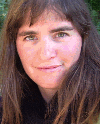 Judith
Mole (Conference chair) Judith
Mole (Conference chair)
Judith founded Direct Learn Services in 2001 after working
in education since 1992. A graduate of the University of Derby,
she started working with Deaf students while at college and
has since managed support units for Deaf students both at
Sheffield Hallam University and at the University of Wolverhampton,
where she was also a member of the board of governors. She
has worked both in the higher and further education sector.
She has managed a number of projects for the University of
Wolverhampton which created online BSL/English dictionaries
for art, science and engineering as well as a BSL/English
dictionary for ICT for the DfES Standards Unit. She has written
a number of publications and books on supporting Deaf students.
Judith has a first degree in drama, film and television studies
as well as a PG Cert in TESOL from Sheffield Hallam University.
|
|
 Gary
Morgan (UK) Gary
Morgan (UK)
Gary Morgan is a professor of psychology in the Department
of Language and Communication Science at City University London.
He started his career with a psychology degree from Manchester
and a PhD from Bristol. He worked in Barcelona for 2 years
and came back to London to work in linguistics at UCL, before
moving to City University in 2001. His specialism is in language
and cognitive development, and at the Deafness, Cognition
and Language Centre (DCAL) he works in 3 main areas: language
development, atypical language development and social-cognitive
development.
|
|
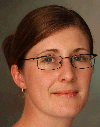 Jemina
Napier (Australia) Jemina
Napier (Australia)
Jemina Napier is an Associate Professor in the Department
of Linguistics at Macquarie University in Sydney, where she
is Head of the Translation & Interpreting programs and
Director of the Centre for Translation & Interpreting
Research. Jemina has over 20 years experience of signed language
interpreting (practising in Auslan, BSL and International
Sign) and over 14 years experience as an interpreter educator.
She has taught interpreters in the UK, Australia, USA, New
Zealand, Brazil, Kosovo, and Fiji. Her major research interest
is in the field of signed language interpreting, but her wider
interests include effective translation and interpreting pedagogy,
sociolinguistics, and discourse analysis. She has published
over 40 books, book chapters and articles discussing aspects
of signed language interpreting and interpreting pedagogy.
|
|
 Andy
Owen (UK) Andy
Owen (UK)
Andy Owen is a full time communication support worker who
is a qualified sign language interpreter. He is the chair
of the Association of Communication Support Workers (ACSW),
serves on the committee of the National Association for Tertiary
Education for Deaf People and sits on the Deaf Education Support
Forum. Andy has authored two books: a dictionary of religious
signs and a manual for the inclusion of Deaf people in protestant
churches. He edits the ACSW eNewsletter and writes and campaigns
on Deaf issues.
|
|
 Arun
Rao (India) Arun
Rao (India)
Arun C. Rao is the director of The Deaf Way Foundation and
the president of the Indian Association of Sign Language Interpreters.
Deaf Way has been a long term partner of Voluntary Services
Overseas (VSO) in India, having volunteers in the areas of
web design, legal casework, organisational development and
the latest for developing interpreting in India.
ASLI in India was founded in 2007 to be a campaigning force
and to increase the number of known interpreters. It currently
provides short interpreter training programs, is a representative
of the interpreting profession to the government and seeks
to increase knowledge of the interpreting profession in India.
|
|
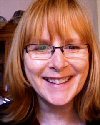 Liz
Scully (Canada) Liz
Scully (Canada)
Liz has over two decades of experience as an interpreter
and trainer working in the Deaf and Deafblind communities
and has interpreted in 24 countries over 5 continents. Liz
has worked in a variety of predominantly Deaf situations.
In 1996 Liz authored a curriculum for an ASL/English interpreter
training program at Cambrian College, Sudbury, in which she
taught.
From 2005 - 2007, Liz taught in the interpreter tract of
the BSc offered by the Centre for Deaf Studies at the University
of Bristol, England. Currently, Liz has completed the dissertation
portion of an MSc in Deaf Studies from that same university.
Her research focus explores how to be a good hearing citizen
in the Deaf community.
|
|
 Jennifer
Smith (UK) Jennifer
Smith (UK)
Jennifer worked as a Voluntary Services Overseas (VSO) volunteer
at the Deaf Way Foundation in India from November 2009 to
November 2010. She worked closely with both organisations
to develop the Indian Association of Sign Language Interpreters
and in creating an interpreting training program for people
fluent in Indian Sign Language such as bilinguals.
|
|

